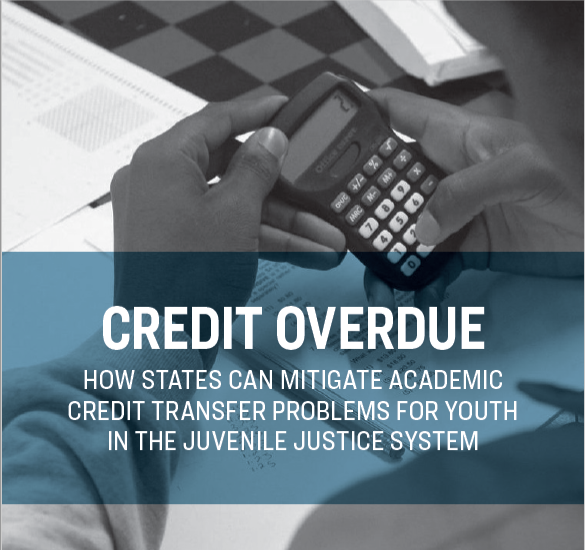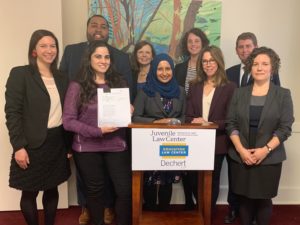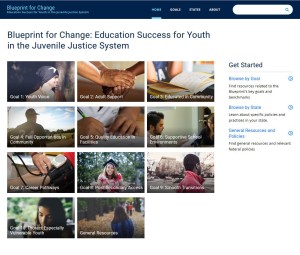On December 11, 2025 ELC filed a state administrative complaint against the School District of Philadelphia and the PA Dept of Education challenging continuing educational deficiencies for students with disabilities detained at the Philadelphia Juvenile Justice Service Center (“PJJSC”). The complaint was filed on behalf of individual students and all students similarly situated to remedy policies and practices that result in the denial of a free appropriate public education to these students, including unilateral changes to a youth’s school placement and significant reductions in special education services and supports. The full complaint is available here
Juvenile Justice
ELC Files Complaint Challenging Lack of Education at Allegheny County Jail
December 21, 2023 – A state administrative complaint filed today by the Education Law Center claims that school-age youths with disabilities at the Allegheny County Jail (ACJ) are not receiving a free appropriate public education in contravention of their rights.
Allegheny County Jail serves approximately 2,000 individuals each day who are awaiting adjudication of charges imposed against them. On any given day, this population includes 20-35 youths aged 15-17 and many more youths aged 18-21 years old – all of whom are entitled to a public education. A disproportionate number of these youths are likely students with disabilities who are entitled to receive a “free appropriate public education.” According to the National Disability Rights Network, young people with disabilities make up at least two-thirds of those involved in the juvenile justice system.
The complaint identifies Pittsburgh Public Schools (PPS) as the host district for students at ACJ responsible for providing educational services to school-age youths. PPS contracts with Allegheny Intermediate Unit (AIU), which manages the school program at the jail.
“ELC filed this complaint to remedy systemic policies and practices that deprive students with disabilities of their right to a free appropriate public education. These policies clearly and unequivocally violate the federal and state disability laws and, due to systemic racism, disproportionately impact Black and Brown students who are victimized most by the school-to-prison pipeline,” said Maura McInerney, legal director at Education Law Center-PA.
According to the complaint, students aged 18 years and older are denied access to the on-grounds school program. Instead, upon turning 18, these students may be offered self-guided study packets to be used completely on their own with access to a teacher once a week; or they are offered a GED program.
“Students who do not have many high school credits are urged to ‘sign themselves out’ of high school and take the GED, regardless of their disability or need for support,” said McInerney. “In one case, a 19-year-old student with significant disabilities received no education at all during his time at ACJ from March to November 2023.”
“Youths in the juvenile justice system or who are placed in adult jails like Allegheny County cannot be deprived of their right to an education, yet that is precisely what is happening here, and it must be remedied,” McInerney said.
National Report Exposes Harmful Academic Credit Transfer Policies, Practices for Youth in Juvenile Justice System

Philadelphia, PA (October 8, 2020): Juvenile Law Center, Southern Poverty Law Center, and Education Law Center-PA have released the report Credit Overdue: How States Can Mitigate Academic Credit Transfer Problems for Youth in the Juvenile Justice System. The report details the problems facing tens of thousands of youth on any given day in our country when it comes to their educational experiences in juvenile justice facilities. While these facilities provide classes to prevent young people from falling behind in their schoolwork, many discover that when they return to school they will not receive full academic credit for their completed coursework, that there is no record of their credits, or that their credits will not count toward graduation.
The lack of attention to ensuring that credits are awarded for coursework performed has serious educational and emotional consequences that put graduation and opportunity further out of reach.
Read our news release and the full report. Here is a fact sheet with highlights from the report.
Class Action Suit Against Glen Mills Schools and Pa. Officials Cites Abuse of Children, Deprivation of Education
Lawyers from the Education Law Center, Juvenile Law Center, and Dechert LLP filed a class action lawsuit April 11 in Philadelphia on behalf of hundreds of youth who were held at Glen Mills Schools, a residential facility located in Delaware County. This site, the oldest reform school in the country, housed as many as 1,000 boys from all over the country – and the world – at one time. After an emergency removal order of all remaining children at the facility as well as the revocation of its licenses by the Pennsylvania Department of Human Services, it is currently empty; these actions followed groundbreaking investigative reporting by the Philadelphia Inquirer’s Lisa Gartner.

The legal team from Education Law Center, Juvenile Law Center, and Dechert LLP
The suit maintains that these youth housed at Glen Mills suffered at the hands of Glen Mills leadership and staff. Instead of receiving treatment and services, as required by the Pennsylvania Juvenile Act, plaintiffs claim that they were subjected to extreme and sustained physical and psychological abuse and deprived of an education. The abuse had a particularly dire impact on youth of color – the vast majority of Glen Mills youth were African American – as well as students with special education needs and disabilities, whose educational and other rights were ignored.
The suit asserts that officials at the Pennsylvania Department of Education and the Chester County Intermediate Unit allowed Glen Mills’ education program to operate in the shadows without any oversight or monitoring to ensure the educational rights of students. The suit also maintains that the persistent and barbaric abuse went unchecked due to the Pennsylvania Department of Human Services “callous disregard for the safety and well-being of the children in its care.” PA-DHS is the body responsible for the licensing, oversight and regulation of child residential facilities in the Commonwealth.
Plaintiffs seek damages as well as other equitable relief for violations of their rights under the Eighth and Fourteenth Amendments to the US Constitution, the Individuals with Disabilities Education Act, Section 504 of the Rehabilitation Act, the Americans with Disabilities Act, and state common law claims.
Read our press release here.
Read our complaint here.
Read press coverage of the lawsuit here, here, and here.
Youth in Pa. Residential Institutions: Unsafe, Disconnected, Denied Quality Education
This column by ELC legal director Maura McInerney and Juvenile Law Center staff attorney Kate Burdick highlights the urgent need to address harmful practices in Pennsylvania’s juvenile justice and child welfare residential facilities. Two recent reports laid out the harm being done to children in these placements – and proposed needed reforms, including bringing children back to their communities. The column was published by WHYY.
Education and conditions in juvenile detention remain poor, advocates say
WHYY reports on poor conditions in Philadelphia-area juvenile detention centers, quoting ELC Legal Director Maura McInerney. Read more here.
Advocates Launch Website with Educational Resources and Best Practices for Youth in the Juvenile Justice System
 ELC is proud to to announce the launch of a dynamic new website focused on educational success for youth involved in the juvenile justice system – Blueprint for Change: Education Success for Youth in the Juvenile Justice System. Continue reading
ELC is proud to to announce the launch of a dynamic new website focused on educational success for youth involved in the juvenile justice system – Blueprint for Change: Education Success for Youth in the Juvenile Justice System. Continue reading
President Obama Reauthorizes ESEA, Affording Groundbreaking Provisions for Children in the Foster Care and Juvenile Justice Systems
The following is a joint press release for immediate release by Juvenile Law Center, National Center for Youth Law, Education Law Center of Pennsylvania, and American Bar Association.
Contact:
Katherine Burdick, Juvenile Law Center 215-625-0551
Jesse Hahnel, National Center for Youth Law 510-835-8098 x 3003
Maura McInerney, Education Law Center of PA 215-238-6970 x 316
Priscilla Totten, American Bar Association 202-662-1094
Washington, DC (December 10, 2015) – President Obama today signed into law the Every Student Succeeds Act (ESSA), which is the reauthorization of the Elementary and Secondary Education Act (ESEA), a key federal law governing education, originally signed into law in 1965 and last reauthorized as No Child Left Behind in 2002. The ESSA is the first major overhaul of federal education law in over a decade. Among many new provisions, the law now requires states to ensure certain protections for vulnerable youth in the foster care and juvenile justice systems.
“Children in foster care are often forced to change schools multiple times, disrupting important relationships and derailing children’s educations. The new provisions in ESSA are an important advance in ensuring school stability and academic success for students in foster care, and we look forward to supporting schools and child welfare agencies to ensure smooth implementation,” said Kathleen McNaught of the ABA Center on Children and the Law, who leads the Legal Center for Foster Care and Education.
The Legal Center, a collaborative project between the ABA, Juvenile Law Center and Education Law Center of Pennsylvania, along with the National Center for Youth Law and other members of the National Working Group on Foster Care and Education, have worked for years to educate members of Congress on the unique challenges faced by children in the foster care system.
“Eliminating enrollment delays and ensuring school stability make profound differences for students in foster care. Research shows that even one fewer placement change doubles the likelihood that students in foster care will graduate high school,” said Senior Staff Attorney Maura McInerney at Education Law Center of Pennsylvania.
Although states and districts will be grappling with implementation of ESSA’s many new provisions, the protections for youth in foster care hold great promise. The newly enacted ESSA is expected to reduce disruptions in education for youth in foster care and provide them with greater school stability, continuity and success through a number of provisions, including:
- Allowing youth in foster care to remain in the same school even when their foster home placements are changed
- Requiring schools to immediately enroll children in foster care after a school move
- Requiring points of contact in every state education agency as well as many school districts
- Requiring planning for school transportation for youth in care
- Tracking achievement data for youth in care
“Numerous studies have found the educational outcomes of students in foster care to be tragically poor,” said Jesse Hahnel, Executive Director of the National Center for Youth Law. “Disaggregating foster student data will allow the public and policymakers to understand and respond to the student achievement needs of foster youth in a systemic way.”
By requiring the disaggregation of achievement data for various sub-groups including foster youth, African-Americans, English Learners and Special Needs students, school districts and states will be able to see important trends in achievement and use limited resources where they are needed most. Including foster youth as a subgroup will document and make public, for the first time, the extent of the achievement gap for youth in foster care.
The law also affords significant protections for youth in the juvenile justice system. “Youth involved with the juvenile justice system are also at a high risk for academic failure,” said Katherine Burdick, Staff Attorney at Juvenile Law Center. “These students are often struggling with family issues, mental health issues, substance abuse, or abuse and neglect. If we really want these students to succeed, we need to remove the barriers to academic success, not make it more difficult for them.”
New ESSA provisions will improve the rates of success for youth being rehabilitated in the juvenile justice system. Under the new ESSA, states receiving Title 1 Part D funding (funding for prevention and intervention programs for children and youth who are neglected, delinquent or at risk) must provide protections, including:
- Providing better planning and coordination of education between facilities and local districts
- Supporting reentry to the community for youth returning from juvenile justice placements, including timely re-enrollment in appropriate educational placements
- Creating opportunities to earn credits in secondary, postsecondary, or career/technical programming
- Requiring transfer of secondary credits to the home school district upon reentry
- Prioritizing attainment of a regular high school diploma
The National Center for Youth Law and the Legal Center for Foster Care and Education (a collaboration of the American Bar Association Center on Children and the Law, Juvenile Law Center, and Education Law Center of Pennsylvania) look forward to working with states to implement these new provisions.
###
The National Center for Youth Law (NCYL) is a national non-profit organization that has been working for more than four decades to improve the lives of poor children. For more information visit youthlaw.org or follow on Twitter@NCYLNews.
The Legal Center for Foster Care and Education is a national collaboration between the American Bar Association Center on Children and the Law, Education Law Center and Juvenile Law Center designed to provide a strong national voice for the education of children in foster care and a national clearinghouse for information on foster care and education. For more information visit fostercareandeducation.org or follow on Twitter @FosterEdSuccess.
Juvenile Law Center is the world’s oldest non-profit, public interest law firm for children, working to advance the rights and well-being of youth in the justice and foster care systems. For more information visit jlc.org or follow on Twitter @JuvLaw1975.
Education Law Center of Pennsylvania works to ensure that all children have access to a quality public education, including poor children, children of color, children with disabilities, children in the foster care and juvenile justice systems, English language learners, and other vulnerable children. For more information visit elc-pa.org or follow on Twitter @edlawcenterpa.
With more than 400,000 members, the American Bar Association is one of the largest voluntary professional membership organizations in the world. As the national voice of the legal profession, the ABA works to improve the administration of justice, promotes programs that assist lawyers and judges in their work, accredits law schools, provides continuing legal education, and works to build public understanding around the world of the importance of the rule of law. Follow the latest ABA news at www.ambar.org/news and on Twitter @ABANews.